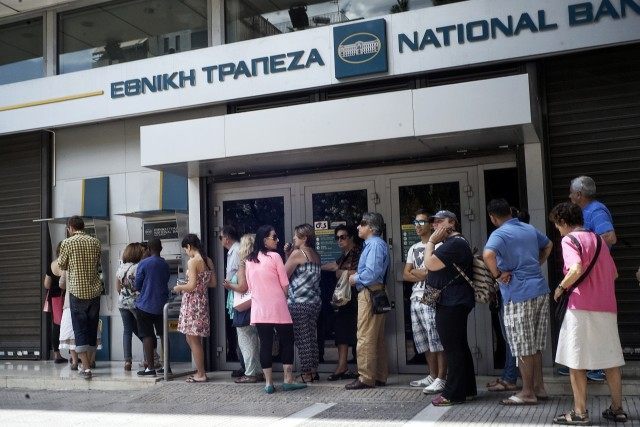UPDATE: European Central Bank confirms it will maintain emergency liquidity assistance to Greek banks.
–
The most dramatic day yet in Greece’s months long economic crisis saw a run on banks and the confirmation of next Sunday’s referendum on a bailout deal. The public vote on the the latest rescue terms offered by creditors to unlock billions of euros in bailout funds passed easily, but attracted negative reactions from other countries in the Eurozone.
The Greek government easily passed the motion authorising the referendum, with deputies from the far-right Golden Dawn uniting with the left-wing government on the issue. Greek pro-European parties New Democracy, Pasok and To Potami and the KKE Communist party voting against. However, Eurozone partners rejected the plea from Prime Minister Alexis Tsipras temporarily to extend the current bailout to cover the period leading up to next Sunday’s referendum.
Athens is now likely to default on the key €1.5 billion payment due to be made to the International Monetary Fund on Tuesday and Austria’s Finance Minister Hans Jorg Schelling told Die Presse a Greek exit from the euro “appeared almost inevitable now” but would mean Greece first asking to leave the European Union. Accusing Greece of “playing poker” he added:
“The consequences for the euro countries are not nearly as bad as for Greece. It’s clear that one country can under no circumstances blackmail the European Commission and the euro countries.”
The handling of the crisis in the last few days reached farcical levels. Bloomberg reported Greek negotiators in Brussels found out about their country’s referendum via Twitter:
“It was the first they’d heard about it. They soon left the room, their attempts to thrash out a compromise in tatters. Commission negotiators called their president, Jean-Claude Juncker, who had spent recent weeks in face-to-face talks with Tsipras. He hadn’t known about the vote either, the official said. A Greek government spokesman wasn’t immediately available for comment. Up until then, the mood on both sides had been fairly positive, the official said.”
Meanwhile Greeks fearful of possible capital controls have been withdrawing their money from banks. With queues seen in major cities such as Athens and Thessaloniki some reports say more than a third of ATMs ran out of cash and other banks are limiting cash transactions. One shop owner told AFP she was pulling out “as much money as I can in order to cover the needs of my shop for next week.”
The European Central Bank had the Greek banking system on life support with cash infusions otherwise refused to the country now frozen out of capital markets. Bloomberg reports that some banks may not be able to open on Monday unless there was an emergency liquidity injection from the Bank of Greece.
The problem is not limited to Greek banks. An official with the Capital Markets Commission, the Greek markets’ regulator, warned that the Athens Stock Exchange could be closed on Monday if banks are refused emergency liquidity. A spokesman for the Greek central bank said it is trying to assist.
Zerohedge highlights another side-effect of the run on banks:
“…during the same period over which Greek banks lost nearly €30 billion in deposits, banknotes in circulation jumped by some €13 billion. In short, because Greeks are increasingly prone to stuffing their euros in mattresses, a large proportion of the deposit flight has come in the form of hard currency withdrawals, meaning the Bank of Greece is forced to (literally) print billions in physical banknotes…Crucially, this is not just about banks being in trouble – drained of deposits electronically – this is running out of physical banknotes,there is literally no more physical cash left in Greek banks.”
Eurogroup head Jeroen Dijsselbloem said the other 18 eurozone finance ministers will now hold talks in Greece’s absence to “prepare for what’s needed to ensure the stability of eurozone remains at its high level.”
The Daily Mail reports that as the Greek Finance Minister Yanis Varoufakis left Brussels he warned that the rift with Athens would damage the euro zone’s credibility as a “democratic union…and I’m very much afraid that that damage will be permanent.”

COMMENTS
Please let us know if you're having issues with commenting.